
Have you ever heard someone cracking their knuckles and wondered what’s causing the “popping” sound? Hint: it has to do with your joint capsule, a fluid-filled connective tissue container that surrounds and contains your joint. The fluid inside contains gases including oxygen, nitrogen and carbon dioxide. When you stretch of pull your joint beyond its normal range of motion, the pressure inside the joint capsule changes, creating a vacuum effect and causing a gas bubble to form and burst with a “pop”!
Another, much less amusing and more serious cause of joint popping is because something (like a torn or loose piece of knee cartilage) is caught between the joint surfaces. When this happens, sometimes the knee can lock with a loud ‘pop’. Once a joint is stuck like this, it may need to be jostled around to free the object that is stuck – and when it is dislodged it can cause another pop. Ew.
What you probably REALLY wanted to know though – was whether your mom was right when she said you shouldn’t crack your knuckles. And of course she was right! She’s always right, isn’t she? Studies have shown that knuckle cracking is related to hand swelling, lower grip strength and damage to the ligaments that surround the joint. And if you stop to think about it, when is it ever a good idea to forcefully tug your joints beyond their natural end range? *crickets*
You never actually NEED to crack your knuckles, but you might sometimes feel like stretching your hands and fingers. Next time you get the urge to crack your knuckles, try this Yoga Tune Up® wrist stretch instead.
This article is part 4 of a 4-part series on interpreting sounds from the joint space.
Enjoyed this article? Read Snap, Crackle and Pop – Part III: Crackle and Crepitus
Sources
Nichols, Hannah. “Why do knuckles and joints crack? Can cracking joints cause arthritis?” Medical News Today. February 3, 2015.
Everyday Mysteries. Fun Science Facts from the Library of Congress. “What causes the noise when you crack a joint?” Retrieved from http://www.loc.gov/rr/scitech/mysteries/joint.html. February 3, 2015.
Matsen, Frederick A. III, MD. “Joints.” UW Medicine. www.orthop.washington.edu


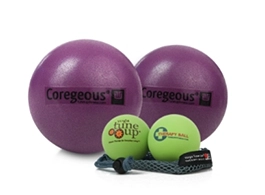
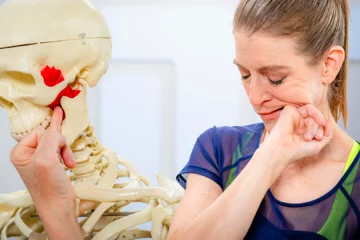
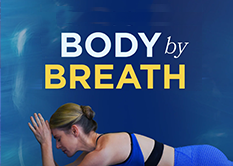



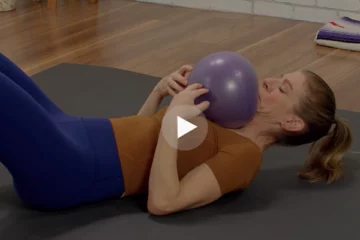
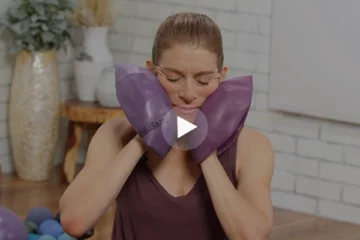
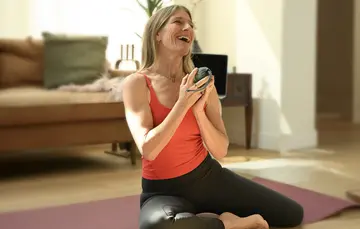

Ugh. This reminds me of when I was a kid & my cousins would terrorize me by capturing me, sitting on me to pin me down & torture me by cracking my knuckles for me (because they knew I hated it). I just loved reading through this series… the only thing missing is back cracking! When I was young & foolish I used to get my rugby coach to hug me & whip my spine into extension for me. Not to worry… now as a responsible adult, I have my osteopath or chiropractor make much safer adjustments 😉 BUT boy-oh-boy is it ever satisfying to get the same tension relief with each & every pop as I roll out at home now. HURRAH for tune-up balls!!!
People are often worried if they hear their bodies click or crack and as part III and IV of this knee series explains, there can be multiple reasons. Many times if you have a good understanding of your body, you can probably feel if its a ligament snapping over a bone or if its bone rubbing on bone. I find it that depending on my body part that is making the noise, they are all different reasons! I understand many times it can be worrisome and if it is getting worse or is accompanied with severe pain, maybe it would be smart to have a professional assess it. Other times, it is dependent on how we have been moving or maybe you started a new work-out and things are changing.
Cognitive dissonance in childhood:) I think we all knew our moms were right when they told us not to crack any parts of our bodies, but we refused to believe it and had to do it anyways, and now we tell it to our own kids !
Popping due to going beyond the normal range of motion – so helpful! It’s a great guide to listen to my body and when that comes up to know what could be stretched and strengthened in order to increase the range of motion so that the bursting can be reduced. And a great reminder that a stretch is better than stretching to the point of popping.
Loved the option for the finger cracking
Good point about how knuckle cracking is ACTUALLY bad for us. I don’t think my mom actually knew WHY it was bad, but I listened to her anyways when I was younger and never got into the habit of cracking my knuckles.
Sharing this with all the knuckle crackers out there and instead going to ask them to roll and stretch. Wish me luck! Hope I don’t get a knuckle sandwich 🙂
Also on a more serious note, good to know the reason behind normal popping sounds coming from joints moving in their normal ROM and that this is okay. Thanks again, really loved this snap crackle pop series.
Interesting…. knuckle cracking is related to hand swelling, lower grip strength and damage to the ligaments that surround the joint. I don’t remember last time i cracked my knuckles, unless I do it unconsciously but it does put things into perspective. I don’t have issues with grip strength but I do with keeping the tension on a close grip like when i’m doing lateral pull downs at the gym… I love that wrist stretch routine, I do it every time I go to a yoga class (before class starts) and actually should do it during the day specially if you’re working with a mice and keyboard all day, would help and prevent carpal tunnel.
I am going to share your article with my son (14 years old). He is constantly cracking his knuckles and always says that it “feels” good. Your explanations will help him better understand what is happening – and hopefully stop his knuckle cracking in its tracks. Thanks for sharing. I enjoyed your series of articles!
Thanks again Amanda on more intake on what happens when your joint pops!
My chiropractor a long time ago convinced me to stop cracking any of my joints and it takes a lot of restraint at times to not go back to habit. I do love the wrist and finger stretches – I work with a lot of desk working humans so these are great to share with them.
Updated research shows that there is no evidence that knuckling cracking is harmful. No evidence that it contributes to OA and no evidence of swelling, ligament damage, decreased grip strength compared to people that don’t knuckle crack. http://time.com/3529225/cracking-knuckles-arthritis/
(I did a quick search on pub med to confirm this as well). Some of this research is newer so you may want to update your blog- no reason for people to be scared. Also of interest is this newer research that is pointing to bubble formation (rather than collapse) as to the cause of the pop that we hear. http://journals.plos.org/plosone/article?id=10.1371/journal.pone.0119470 Bottom line is there isn’t really enough current evidence to point to joint popping noises, (or asymptomatic hip snapping) leading to future problems. That’s all just conjecture that may or may not be true.
This is such an interesting, and frustrating topic for me. As when I do my wrist stretches and even apply just a little pressure to my fingers, they crack, with this heroine like addiction to the sensation of freedom it brings me. I have tried to stop cracking my knuckles, but then they just crack when they need on their own. My elbows pop occasionally when I extend them, but if I do it twice. Even when I am so strong and supported my spine, knuckles, and toes pop once a day. When do we really know what and what level is wrong? Because I look it up and I see videos of really weird cracking sounds in people, that sound very wrong, mine sound nothing like that. But I want to be safe and smart and not damage joints or the fluid around them. This topic is actually super frustrating for me!
I have a few friends that I’m going to share this information with! I don’t crack my knuckles much anymore, but next time I get the urge I’m going to try the hand/wrist stretch instead. Hands and fingers get so much use, but not enough attention. Thanks for the article!
That was super interesting – a gas bubble! I’m gong to show this to my daughter. I’m a broken record correcting her knuckle cracking but maybe reading this will sink in. Good alternative stretch to satisfy the urge to crack.
I perform a very similar stretch as Jill as the first thing before I practice yoga. Clearing out my fingers is absolutely critical to my yoga practice before I begin to bear any weight on my arms. I see many students who struggle with wrist pain. While i know this pain is often instigated in neck and shoulders, the simple wrist release exercises go a long way to decompress the joint and relieve a build up of tension.
One of my sons cracks his knuckles all the time and we have discussed it often I felt it wasn’t good for him,now I know why.it makes me think about what you mentioned in class Amanda ,try not to fidget after coming out of a posture.
I am going to make my son read your blog.
I tried Jill’s video and I love how she goes raises the palms, then the hand slowly (knuckle by knuckle). Awesome fascia stretch!
So many knuckle crackers in my life – thanks for the alternative
I will be passing on the knuckle cracking information to my yoga students. I teach a similiar method to the Yoga Tune Up wrist stretch as show in Jill Miller’s video. I liked Jill’s peeling away method which applies more stretch to the areas.
Thanks for the information on some of the consequences that could happen due to knuckle cracking. Grip strength was a surprise but made total sense.
Thanks for the explanation on the sound and information of damage it may be causing. I have two kids who do it frequently and I would like to work on getting them to do more stretching and ball work with their hands instead.
This is a very thorough explanation of what is happening in the joint when knuckles are cracked . Instinctively I believed that it was not a good idea to crack knuckles repetitively . Now I have the full explanation and the reason as to why not to do so .
I will retire my knuckle cracking for this stretch instead! I have a client who cracks EVERYWHERE – In your opinion, is that something that can be worked on with Yoga Tune Up? Or is it indicative of a greater global issue?
I must show my husband this article, he loves crackling his fingers and toes! I will see if the wrist stretch could help him to kick this habit. Thanks!
While I am disappointed that I have to stop cracking my knuckles, (it’s so satisfying!!) I appreciated the simple explanation and caution. I will begrudgingly incorporate the carpel tunnel stretch instead!
Good to know that popping sounds can be harmless. Though also good to know you don’t want to risk intentionally popping joints. I’m pretty lucky that I’ve never been able to crack my knuckles.
I like the explanation of where the nitrogen comes from. I always hear about how the joint popping sometimes is a nitrogen release but didn’t know why or how. I also love the reminder to not crack the knuckles. Last time when I heard it explained to me, the teacher used an example of a physician that kept cracking his knuckles for 10 years as an experiment and didn’t actually develop arthritis. Of course I only remember this example and most likely as an exception, and don’t remember the cons of cracking knuckles when I was taught this at a lecture. Thank you for the insights and it’s also great to know I can do something with my hand when I feel the urge to crack.
Thank you for sharing Amanda. I actually crack my knuckles mainly because I do feel like sometimes I need to because the joint feels stuck. I will definitely try this exercise and hopefully it will alleviate that uncomfort and will no longer have the need to snap, crackle and pop!
Cracking the knuckles feels like it relieves some kind of pressure (that pressure is creating the urge to crack them). So what can you do for the fingers to relieve that feeling?
I heard before the explanation about the gas, but don’t remember it being linked to your joint going beyond its normal range of motion, now it makes sense. And of course explained this way it would never appear like a good idea!
Bad habit that I’m guilty of doing! Good to know what’s actually happening each time and I appreciate the alternate way to find the same relief. I’m anxious to give it a try!
Thank you for explaining what that popping sound is. Though the popping didn’t hurt when I was younger, I found the sounds irksome and now I know why. I love the carpal tunnel stretch and use it to refreshen my fingers, hands and arms after being on the computer.
Thank you for all the great information on the different snaping and popping sounds a body can make. Since I was a child my body would pop and snap and clunk almost hourly. I have reduced much of this through yoga practice (my neck and shoulders), but made a few things worse (my hips). I’m looking forward to reading the rest of the articles.
My husband regularly cracks his knuckles and I’ve always wondered what it is really doing. Now I can tell him with a suggestion of what to do instead. Thanks!
Good stretch. It can also be done one finger at the time with shoulders flexed and elbows extended. Feels so dood after a power yoga class!
This is one of my favorite wrist stretches to do for myself and my favorite to give to students who complain of wrist pain. Thanks for confirming that I should not crack my knuckles. I’ll keep this on in my back pocket – the anatomy clarification will be helpful when trying to convince people not to do it!
ok fine I will stop popping my knuckles. I liked the slow release of the palms from the floor in the video.
My brother is always cracking his knuckles – thanks for giving me the explanation why it’s not good for him and what he can do instead to stretch hands, wrists and fingers. Showing our hands a little tlc and appreciation for all they do for us is the least we can do!
What’s funny about reading this was I instantly felt the urge to crack my knuckles. I’m a knuckle cracker in my toes and fingers. I’d like to read up on more of the research of this. But I most definitely am going to try those stretches! Thanks for the info!
As i read this article, someone is cracking their knuckles right next to me. I just yelled STOP! Thanks for sharing, I ve always know this is bad and never knew why, even with teachers that have talked about the gas bubbles needing to pop. Im excited to now go explain why I just yelled stop and have some useful information to back me up
I LOVE this! I have always been a knuckle cracker and as I’ve gotten older I feel like I just need to do it more often. Up until now I didn’t really have an alternative so I just kept at it. I’ll definitely give this technique a whirl and see if it can help me kick the habit.
Hi Oliver Thank you for your question. The fact that you have an ‘uncomfortable feeling’ in your knee joint before it pops suggests that something is unstable and out of place A healthy joint shouldn’t feel ‘uncomfortable’ – in fact, when a joint is healthy, you’re barely aware of it. I am totally unqualified to diagnose your knee problem, but your description suggests a ‘red flag’ situation, and I would recommend a visit to the doctor or physiotherapist to get to the root cause of the problem. Best of luck!
Thanks for your great series of articles on cracks and pops of joints. I actually have a pop problem with my left knee myself. I read your explanations of the popping sound. I believe the sound my knee makes goes into the “loud pop” category. I can feel the displacement around my left knee area first. This uncomfortable feeling makes we wanting to flex my left knee. There is pop after I flexing my knee. After the pop it feels like something gets restored. It does not hurt during this process, it just made me feeling a little uncomfortable. I am only 24, is the wearing out of joints the cause of my issue?
Thank you!
I regularly teach a similar posture, I find though that it is really necessary to cue “elbows bent toward the body” or hyperextension is common. I see exactly that happening in the beginning of this video with Jill’s elbows.